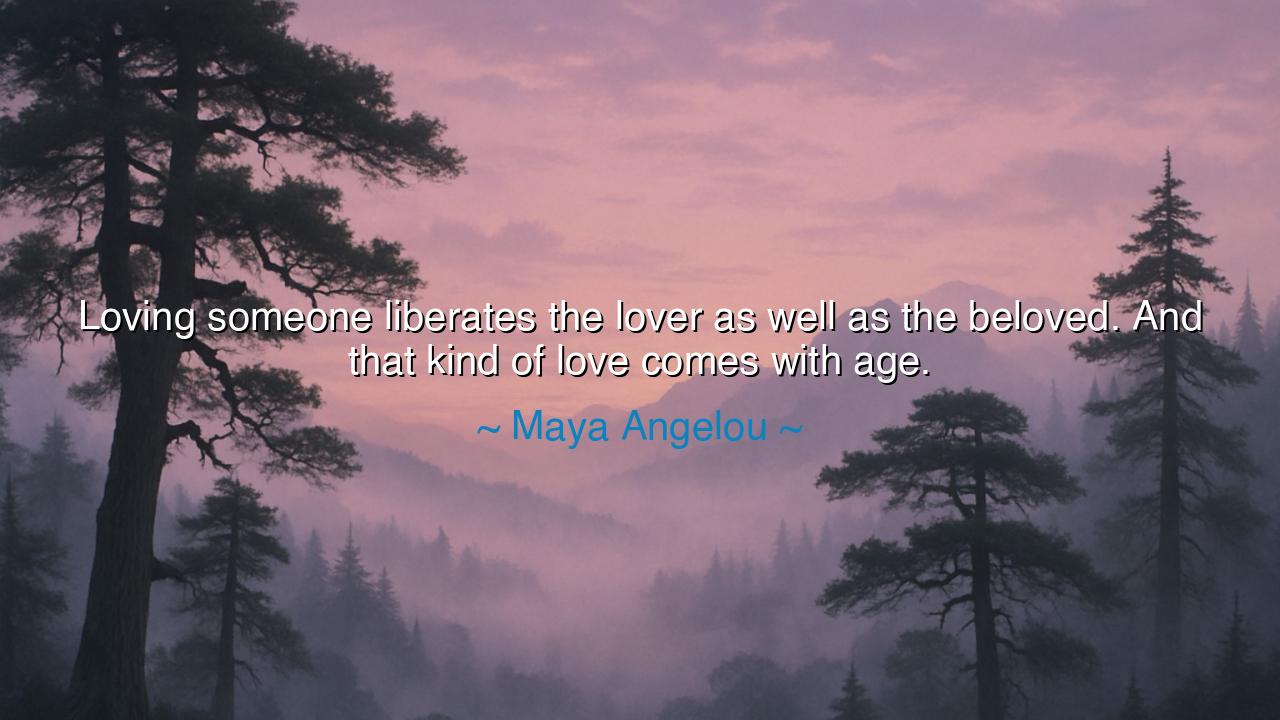
Loving someone liberates the lover as well as the beloved. And
Loving someone liberates the lover as well as the beloved. And that kind of love comes with age.






“Loving someone liberates the lover as well as the beloved. And that kind of love comes with age.” — Maya Angelou
Thus spoke Maya Angelou, the poet of the human soul, whose words are wings of truth and thunder. In this profound reflection, she unveils a truth that only the wise and the weathered fully know: that love, in its truest form, is not possession but liberation. To love another not as a thing to hold but as a soul to free — that is the sacred art of mature affection. And yet, such love does not bloom in youth’s first spring. It is the fruit of many seasons, ripened through suffering, patience, and the long schooling of the heart.
In our earliest years, we mistake love for ownership. The young heart, fierce and untested, clings to the one it adores and calls this devotion. But this is not yet liberating love; it is a tender hunger born of fear — fear of loss, fear of loneliness, fear that we are incomplete. True love, the kind that frees both the lover and the beloved, comes only when one has faced the storms of life and learned that the heart’s fullness is not found in grasping, but in giving. To love freely is to stand with open hands and say, “Go, if you must — and return, if you will. I am whole either way.”
Maya Angelou, who lived through the trials of oppression, loss, and rebirth, spoke from the depth of lived wisdom. Her life was a hymn of resilience — she knew what it was to love and to lose, to hold tight and then let go. When she says that such love “comes with age,” she speaks not merely of the passing years, but of the soul’s maturing — that inward ripening where passion transforms into compassion, and desire becomes grace. Only those who have walked through heartbreak without bitterness can understand that love’s truest power lies not in claiming, but in setting free.
The ancients, too, knew this truth. Consider the story of Antony and Cleopatra, lovers whose passion shook empires. Their love burned bright, yet it enslaved them both — one to longing, the other to pride. They loved fiercely, but not freely, and their hearts became chains. Contrast this with the love of Odysseus and Penelope, who though separated by oceans and decades, remained bound not by possession, but by faith. Theirs was a love strengthened by distance, purified by endurance — a love that freed each to be wholly themselves, yet forever united in spirit.
In this balance lies the essence of Angelou’s wisdom: that love, like the sun, must shine without demanding the sky in return. The lover, when truly awakened, seeks not to cage but to cultivate, not to command but to uplift. In freeing the beloved from fear and expectation, the lover too becomes free — free from jealousy, from need, from the narrowness of self. Thus, love becomes not a trade, but a transformation. It turns the human heart into a vessel vast enough to hold another’s spirit without suffocating it.
Yet such love is not easily won. It is the reward of humility, of wounds healed and egos tamed. Only with age, when the fires of youth have cooled into steady light, can one truly see love as liberation. It is when we no longer seek to prove, to possess, or to be needed that we can finally love without fear. To love in freedom is the final lesson of the heart — the one that cannot be taught, only lived.
Practical counsel for the seeker:
-
Do not confuse attachment with love; to hold too tightly is to suffocate what you adore.
-
Seek first to be whole within yourself, for only the complete can give without losing.
-
When you love, love with courage — give space, grant trust, and rejoice in another’s growth.
-
And when life tests your heart, remember that the purpose of love is not to bind, but to set both souls free.
For as Maya Angelou teaches, the highest form of love is not passion, but peace — not hunger, but harmony. It is the gentle, eternal knowing that to love another well is to grant them wings, even when those wings carry them away from you. And in that sacred release, both hearts rise — the lover and the beloved — free at last in the vast sky of understanding.






AAdministratorAdministrator
Welcome, honored guests. Please leave a comment, we will respond soon